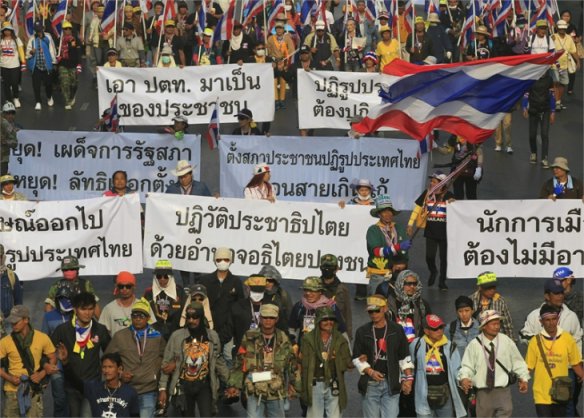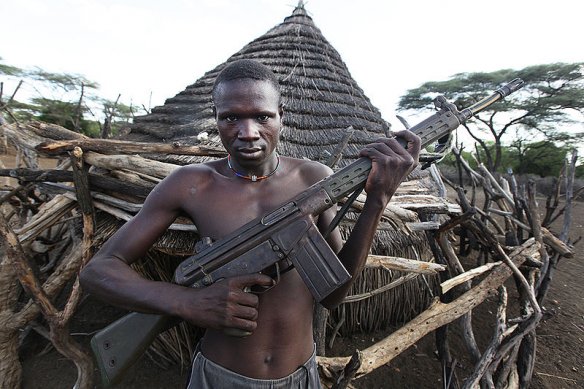It is rather unusual for the official news agency to publish an expert opinion that “the Northern Fleet in its current strength cannot perform even elementary tasks on ensuring national security in this vast region“. The volume of assertive statements has much increased after the short cruise of a squadron led by Petr Veliky along… Read more »
The Battle for Bangkok
In the wake of the power struggle between the political elites in Thailand, we are now seeing a popular uprising.
Once again Thailand’s capital is paralysed by demonstrations. The streets are filled with Thai flags and demands that the prime minister, Yingluck Shinawatra, must step down. “Shut down Bangkok – Restart Thailand!” But behind the façade of colourful placards and catchy slogans lies a brutal political power struggle.

The country’s political crisis seems to be worsening in proportion to the advancing age and deteriorating health of the people’s beloved King Bhumibol. The danger of violent confrontation is significant – just today [17 Jan 2014] 28 people were injured when a bomb exploded in a procession of demonstrators. Unfortunately there is no swift resolution in sight.Read More
Why does Democratization Occur in Waves?
The ‘Arab Spring’ demonstrated that political transitions tend to occur together in space and time.
Samuel Huntington coined the term ‘Waves of democratization’ in his book The Third Wave. The figure above shows that changes to the proportion of the world’s countries that are democracies occurs in spurts. Confirming Huntington’s three waves of democratization, spurts occurred from the 1890s up to 1920, from 1935 to 1945, and from 1975 up to today. There are also reverse waves — from 1920 to 1935 and from 1945 to about 1970.Read More
“Hard security” matters in the Arctic
Russian officials added emphasis on the “hard security” matters in the Arctic in the end-of-the-year self-congratulations. Nikolai Patrushev, the secretary of the Security Council and a big fan of Far North, asserted that “strategic risks for Russia in the Arctic are increasing“. Vice prime minister Dmitry Rogozin argued that “serious players are engaged in a battle,… Read more »
Putin’s course on militarizing the Arctic
My last publication of the year 2013 has appeared in The New Times (in Russian), and it examines the rationale for Putin’s course on militarizing the Arctic, while proclaiming commitment to peace and cooperation. The text has suffered from severe cuts, but for once I have no complaints – they have to make room in… Read more »
No Prospects of Cooling Down: why the Crisis in South Sudan must be Solved Immediately

From Flickr via Wikipedia
The South Sudan crisis becomes more difficult to solve by the hour. The window of opportunity to avoid a full scale civil war is rapidly closing. But, finding a viable solution is dependent on a precise diagnosis of core issues involved.
Read more at the blog of the Norwegian Centre for Humanitarian Studies, posted December 21, 2013 by Maral Mirshahi for Øystein H. Rolandsen.
‘Environmental and Human Security in the Arctic’
I have been writing a short review on the book “Environmental and Human Security in the Arctic” (Hoogensen et al, eds, Routledge: 2014), when a news item about President Putin’s address to the FSB personnel in connection with the “Day of Chekists” has caught my eye. Nothing new in the address (it was quite an… Read more »
‘The Arctic: Region of Cooperation and Development’
The conference in Moscow on “The Arctic: Region of Cooperation and Development” organized by the Russian International Affairs Council with IMEMO and CSIS as key partners had a nice venue in the Lotte Hotel and many important quests, including Deputy Foreign Minister Titov and Deputy Secretary of the Security Council Nazarkin (both in the picture)…. Read more »
The Promise and Perils of ‘Disaster Drones’
The dire humanitarian consequences of the use of unmanned aerial vehicles (UAVs, or drones) in conflict have become all too familiar. In contrast, there has been much less public discussion about the potential humanitarian uses of drones. So-called ‘disaster drones’ offer humanitarian agencies a range of possibilities in relation to crisis mapping, search and rescue and (some way off in the future) cargo transport and relief drops.
Read more in the blog post by Kristin Bergtora Sandvik (PRIO) and Kjersti Lohne (UiO) at the Norwegian Centre for Humanitarian Studies, November 1 2013.
Putin’s “green” awareness
It is certainly very good news that the Greenpeace activists one after another are going out of the prison cells on bail, but the case is by no means closed. This photo taken by Arkady Babchenko and published in his very sharp article on Colta.ru about the striking contrast between the Arctic Sunrise and the… Read more »